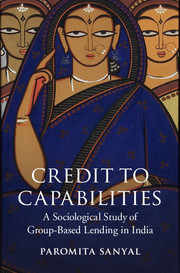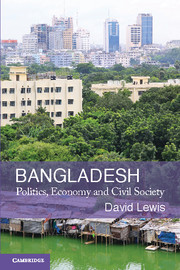Credit to Capabilities
A Sociological Study of Microcredit Groups in India
£26.99
- Author: Paromita Sanyal, Cornell University, New York
- Date Published: June 2016
- availability: Available
- format: Paperback
- isbn: 9781107434479
£
26.99
Paperback
Other available formats:
Hardback, eBook
Looking for an inspection copy?
This title is not currently available on inspection
-
Credit to Capabilities focuses on the controversial topic of microcredit's impact on women's empowerment and, especially, on the neglected question of how microcredit transforms women's agency. Based on interviews with hundreds of economically and socially vulnerable women from peasant households, this book highlights the role of the associational mechanism - forming women into groups that are embedded in a vast network and providing the opportunity for face-to-face participation in group meetings - in improving women's capabilities. This book reveals the role of microcredit groups in fostering women's social capital, particularly their capacity of organizing collective action for public goods and for protecting women's welfare. It argues that, in the Indian context, microcredit groups are becoming increasingly important in rural civil societies. Throughout, the book maintains an analytical distinction between married women in male-headed households and women in female-headed households in discussing the potentials and the limitations of microcredit's social and economic impacts.
Read more- Focuses on the hot topic of microcredit and women's empowerment
- A qualitative (interview-based) study, with four hundred women interviewed
Awards
- Winner of the 2015 Outstanding Book Award, Sociology of Development Section, American Sociological Association
Reviews & endorsements
'Microcredit has been a major interest of development economists for years, given their effectiveness as an engine of upward mobility among the poor. Paromita Sanyal's remarkable book gives us a different lens on their importance. She reveals the critical role of microcredit in enabling women to build independent lives even in the face of traditional suppression. This engaging study should be read by students, scholars and policy makers who want to know how this strategy can make a profound difference for women in developing countries.' Katherine Newman, Provost, University of Massachusetts, Amherst, and author of Taxing the Poor: Doing Damage to the Truly Disadvantaged
See more reviews'The remarkable global phenomenon of microcredits has finally found its wise analyst. Drawing from hundreds of vivid interviews with Indian women, Paromita Sanyal offers bold explanations of when, how, and in what ways microcredits enhance female autonomy. Credit to Capabilities contributes fresh insights to the study of economic activity and household gender dynamics.' Viviana A. Zelizer, Lloyd Cotsen '50 Professor of Sociology, Princeton University, and author of The Purchase of Intimacy and Economic Lives
'Credit to Capabilities is a major contribution to our understanding of the social impact of microcredit on the ability of women to gain autonomy in various spheres of their lives. This qualitative study adds considerable nuances to existing analyses on the topic by parsing out who benefits, when, how much, and how. Sanyal's book is of broad sociological significance as a model for approaching agency and social change. A must-read for students of gender, development, economic sociology, family, deliberation, and much more.' Michele Lamont, Director, Weatherhead Center for International Affairs, Harvard University
Customer reviews
Not yet reviewed
Be the first to review
Review was not posted due to profanity
×Product details
- Date Published: June 2016
- format: Paperback
- isbn: 9781107434479
- length: 336 pages
- dimensions: 227 x 152 x 17 mm
- weight: 0.49kg
- contains: 15 b/w illus. 1 map 15 tables
- availability: Available
Table of Contents
1. The global trajectory of microcredit
2. Agency
3. Converting loans into leverage
4. The power of participation
5. Microcredit and collective action
6. Culture and microcredit: why socio-religious dimensions matter
7. Loans and well-being
8. Interpreting microcredit: beyond the salvation/exploitation alternatives
9. Epilogue: the future of microcredit.
Sorry, this resource is locked
Please register or sign in to request access. If you are having problems accessing these resources please email [email protected]
Register Sign in» Proceed
You are now leaving the Cambridge University Press website. Your eBook purchase and download will be completed by our partner www.ebooks.com. Please see the permission section of the www.ebooks.com catalogue page for details of the print & copy limits on our eBooks.
Continue ×Are you sure you want to delete your account?
This cannot be undone.
Thank you for your feedback which will help us improve our service.
If you requested a response, we will make sure to get back to you shortly.
×





